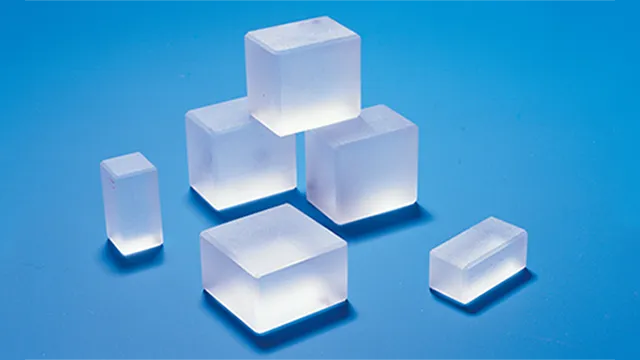KDP, DKDP Nonlinear (NLO) Crystals

KDP (Potassium Dihydrogen Phosphate)、DKDP(Deuterated KDP、KD2PO4), and DKDP (commonly another notation for DKDP) are important materials widely used as Nonlinear Optical (NLO) crystals. These crystals play a particularly important role in laser technology.
Features
- KDP (KH2PO4)
-
Applications: Mainly used for Second Harmonic Generation (SHG), Third Harmonic Generation (THG), and Electro-Optical (EO) purposes.
Characteristics: High transparency (about 200 nm to 1,500 nm), moderate nonlinearity, and high optical homogeneity.
Advantages: Relatively easy to manufacture and capable of growing large-diameter crystals.
- DKDP (KD2PO4)
-
Applications: Mainly used for laser wavelength conversion, electro-optical modulators, and polarization switches.
Characteristics: Suitable for high-power laser systems (especially Nd:YAG lasers) due to its higher laser damage threshold and lower absorption rate compared to KDP.
Advantages: Can be used in the mid-infrared region, especially adopted in laser inertial fusion and high-energy laser systems.
Main Applications
- Wavelength Conversion (Second Harmonic Generation, Third Harmonic Generation)
-
Conversion of the wavelength of Nd:YAG or Nd:Glass lasers to 532 nm (green light) or 355 nm (ultraviolet light).
Mainly utilized in laser processing, scientific research, and the medical field.
- Electro-Optical Applications
-
Used in EO modulators and laser switches (Q switches).
Enables fast and accurate laser control.
- High-Power Laser Systems
- Widely adopted in Inertial Fusion Energy (IFE) projects and laser systems for high-energy physics.
- Spectroscopic Analysis and Communication
- Important for laser generation and transmission in the ultraviolet to mid-infrared range.
- Precautions
-
Since KDP and DKDP crystals are hygroscopic, they need to be stored and used in a dry environment.
Advanced techniques are required for the precision processing of large-diameter crystals.
Basic Properties
| KDP | DKDP | ||
|---|---|---|---|
| Chemical Formula | KH2PO4 | KD2PO4 | |
| Transparency Range | 200-1500 nm | 200-1600 nm | |
| Nonlinear Coefficients | d36=0.44 pm/V | d36=0.40 pm/V | |
| Refractive index (at 1064nm) | no=1.4938, ne=1.4599 | no=1.4948, ne=1.4554 | |
| Electro-optical Coefficients | r41=8.8 pm/V r63=10.3 pm/V |
r41=8.8 pm/V r63=25 pm/V |
|
| Longitudinal half-wave voltage | Vπ=7.65 KV(λ=546 nm) | Vπ=2.98 KV(λ=546 nm) | |
| Absorptance | 0.07 /cm | 0.006 /cm | |
| Optical Damage Threshold | >5 GW/cm2 | >3 GW/cm2 | |
| Extinction ratio | 30 dB | ||
| Sellmeier equations of KDP:(λ in um) | |||
| no2=2.259276+0.01008956/(λ2-0.012942625)+13.00522λ22/(λ2-400) ne2=2.132668+0.008637494/(λ2-0.012281043)+3.2279924λ2/(λ2-400) |
|||
| Sellmeier equations of DKDP:(λ in um) | |||
| no2=1.9575544+0.2901391λ2/(λ2-0.0281399)-0.02824391λ2+0.004977826λ2 ne2=1.5005779+0.6276034λ2/(λ2-0.0131558)-0.01054063λ2+0.002243821λ2 |
|||